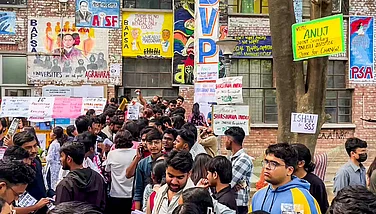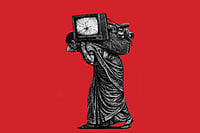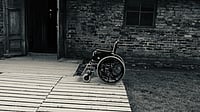“That’s just the point: an honest and sensitive man opens his heart, and the man of business goes on eating—and then he eats you up.”
—Fyodor Dostoevsky, Crime and Punishment
It was in my grandfather’s old house in Arrah in Bihar that I first read Crime and Punishment by Fyodor Dostoevsky as a young girl. I remember the rooms were lined with bookshelves that contained in them entire universes. In those days, there wasn’t much to do. My grandfather, a student of literature, read out poems in the light of the lantern in the evenings. He would talk about the memory that foreshadowed Dostoevsky’s most famous character’s future moments.
Rodion Raskolnikov and his father had witnessed a crowd brutally killing a mule that was too weak to pull a wagon. “But by now the poor boy is beside himself. With a shout he plunges through the crowd into the sorrel, embraces her dead, bloodstained muzzle, and he kisses her, kisses her on the eyes, on the mouth…,” my grandfather read out.
This is the flashback Raskolnikov has before he kills Alyona Ivanovna. Crime and Punishment is a novel that is also about the effects society can have on those who come from a disadvantaged state in the context of class and mental health. In 1866, when the novel was published, 19th century Russia was a transition period—from medieval traditions to Westernisation. It was a time of struggle, of change and of conflict. There was violence and Dostoevsky’s novel was a true representation of the times and the people. He also used time itself as a narrative tool to let readers into Raskolnikov’s feverish mind.
Raskolnikov didn’t kill for money, but for the sake of an experiment that itself puts forth the most important question of our times. Great men like Napoleon commit all kinds of crime and they are hailed as benefactors and not held responsible, the character thought. Could he be such a man? But in the aftermath of the killing of the woman, a pawnbroker, who takes advantage of the poor and abuses her own sister, Raskolnikov is torn between guilt and exhilaration. He is a hybrid like us. He embodies us. Him and us both reflecting and rebelling against liberal thought brought about by economic change that gave rise to many “left behind” people and eventually, to identity politics and the coming of age of mystical nationalism. Raskolnikov is redeemed by a young prostitute Sonya’s spiritual strength.
Crime and Punishment is among one of the many books that shaped my political beliefs and understanding of the world and people. I read it as a young girl in the 1990s when economic liberalisation was announced in India and many transitions took place. Loss of status had already happened when the Bihar Abolition of Zamindaris Act was passed in 1949 that also led to the emergence of capitalist agriculture system.
I have often thought about Crime and Punishment’s characters like Raskolnikov and Sonya. My grandfather told me the books in his house were about people like us. He said Sonya wasn’t degenerate and Raskolnikov wasn’t a criminal. That’s why he read out that passage about the mule. To show me Raskolnikov’s other side.
***
There were many books like Alberto Moravia’s The Conformist published in 1951, which is a story of a not so typical fascist in Italy and a murder and the process of the act itself.
My grandfather lost his eyesight and I remember my aunts reading out to him in his last days. He died in his room in that house surrounded by all the books he had gathered and loved, the books that were a solace to a man who was navigating complex times, the books that let him into other worlds and made him meet characters when he was lonely.
He left behind a lot of books. A few I brought back with me. I took up English Literature in my undergraduate years and everyone said it would not lead to a career. My grandfather had once lamented the fact that he had nobody to pass on all these books to. “Nobody studies literature anymore,” he had said. “It doesn’t lead to profits.”
***
Both of us had imagined the ruthless Siberian winters and felt the despair of Alexander Pushkin, the absurdism in Samuel Beckett’s writings, the hollowness of the American Dream in Death of a Salesman by Arthur Miller and the isolation induced by class and gender in Mrs Dalloway by Virginia Woolf. We travelled to other countries in those pages, met people who struggled with love and loss, with memory and forgetfulness, those who were pitted against fate and the state, with absence and presence and most of all, loneliness. All of these are personal and political at the same time.
***
There was always a poem, a paragraph, a story. Even when the world came crashing down, you knew you weren’t alone because there was someone who had felt it all. Fictional or otherwise.
In a world that is faced with isolation, literature helps to connect, to empathise and to have compassion. It makes us know the other. It helps us know ourselves. It helps us see beauty in the ordinary. Pablo Neruda wrote an entire collection of poems as tributes to everyday things in his Ode to Common Things. It helps us ease our pain, reconcile with loss.
Liberos means, in context, a free adult, a matured citizen. Liberal arts education helps with humanistic enquiry, with education rather than training us to succeed at specific jobs. It liberates us and helps us be less afraid of the other.
This issue is dedicated to all the teachers who told me to look outside the proposed frameworks, taught me how to imagine and how to love, to all the professors who told me that poets are witnesses and poetry is evidence, to my grandfather who read out Dover Beach to me on some evenings and told me that Mephistopheles in Christopher Marlowe’s Dr Faustus wasn’t evil, but someone who has suffered loss of status, and to those who teach and pursue liberal arts despite the promises of profits, to those who take a chance with beauty and to those, who stand against the othering, to those who fight for ideas and give us hope, to those who love despite everything.
This is for all those who stand together against the loneliness that a world order based on profits and othering bring.
This is in defence of liberal arts.






















